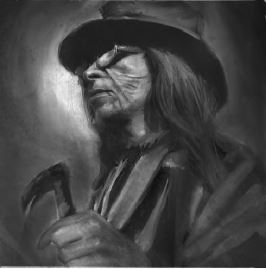Difference between revisions of "Baron Cimitiere"
| Line 36: | Line 36: | ||
Cimitiere dwells in one of several havens located throughout | Cimitiere dwells in one of several havens located throughout | ||
poorer, predominantly black neighborhoods — the heart | poorer, predominantly black neighborhoods — the heart | ||
| − | of vodoun in New Orleans. He conducts frequent | + | of vodoun in New Orleans. He conducts frequent ceremonies |
for Kindred and kine alike. Most of his mortal followers believe | for Kindred and kine alike. Most of his mortal followers believe | ||
him to be solely a powerful houngan, and they remain | him to be solely a powerful houngan, and they remain | ||
Latest revision as of 22:13, 4 October 2015
Perhaps the most enigmatic figure in New Orleans,
Baron Cimitiere is a savior to some, a threat to others,
and a mystery to all. This strange Kindred arrived in the
city in 1799, having left Haiti during the revolt against
French colonial occupation. Of his time before, he speaks
little, even to his most trusted followers. No one knows if
he was native to Haiti or he traveled there at some point
from elsewhere. He says only that he faced Final Death
in Haiti and was restored to his current incarnation
through the aid of the great loa Baron Samedi. Whether
he speaks metaphorically or literally is another detail of
which he does not speak, but he attributes his devotion
to vodoun to that event.
Combining traditional vodoun rites with the powerful
undead magics of his covenant, Baron Cimitiere made a
powerful houngan. For many years after arriving in New
Orleans, he was content to be left alone to participate in
the growth of vodoun culture. It was at this time that he
gained his small but devoted group of Kindred followers
in the city, as well as his far more substantial mortal
congregations. Slowly, he began to realize that both New
Orleans’ Kindred authorities posed a threat to his people
— Prince Vidal because of his intolerant religious beliefs
and his growing fear of Baron Cimitiere’s power and influence;
and Antoine Savoy through his manipulation of
vodoun and its practitioners for purely political ends. Baron
Cimitiere uses his considerable influence among the kine
and his small but influential group of Kindred supporters
in order to oppose both threats. On occasion, necessity has
forced him to cooperate with Savoy against Vidal — as
much as Baron Cimitiere despises Savoy’s misuse of vodoun,
it’s better than Vidal’s overt hostility toward it — but these
alliances have always been short-lived arrangements.
When he is not reluctantly involved in politics, Baron
Cimitiere dwells in one of several havens located throughout
poorer, predominantly black neighborhoods — the heart
of vodoun in New Orleans. He conducts frequent ceremonies
for Kindred and kine alike. Most of his mortal followers believe
him to be solely a powerful houngan, and they remain
unaware of his undead nature. Baron Cimitiere has occasionally
alluded to the existence of other groups of Kindred
vodouisants beyond his followers in New Orleans (in Haiti,
Central and South America, the Caribbean islands and across
the United States). His followers believe that one of his
objectives is to eventually unite them formally in a covenant
to rival the primary five.
Many people mistake Baron Cimitiere for a costumed mummer
upon first meeting him. He appears to be a walking corpse,
his flesh gray and sunken, his teeth and eyes yellowed, his
hair falling to his shoulders in stringy clumps. He dresses in
the traditional fashion of Baron Samedi himself — an old
black suit, cane, top hat and sunglasses. Baron Cimitiere naturally
smells of rot, but he takes great pains and uses a variety
of cleansers and scents to hide that fact. He claims his
corpselike appearance came about when Baron Samedi raised
him from Final Death.
